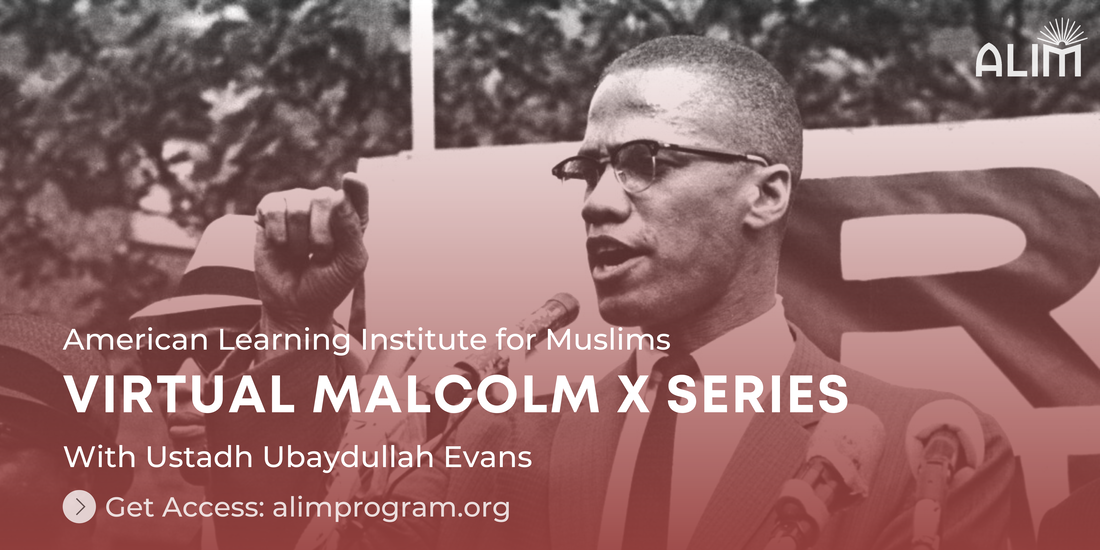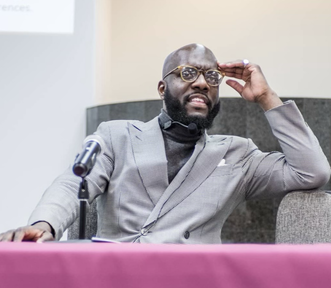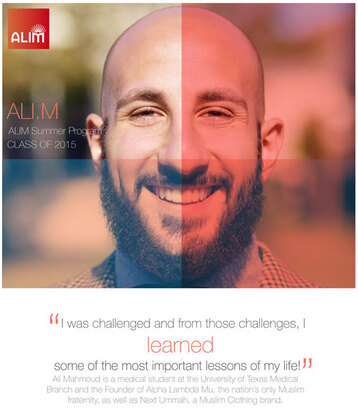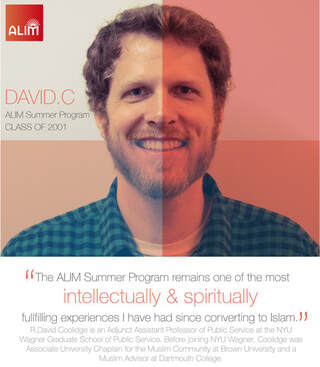Virtual Malcolm X Program
This virtual, discussion-style, four-part virtual mini program is taught by ALIM's respected scholar-in-residence, Ustadh Ubaydullah Evans. By registering, you will get access to pre-recorded sessions that you can watch on your own time. In this self-paced course, you will learn all about Malcolm X's childhood, early life, time in the Nation of Islam, his transition from NOI to Islam, and hear about Ust. Evans' connection to Malcolm X's legacy.
Below, you can find the course schedule, topics that will be covered, and more about the instructor for this course. For questions, please email us.
Below, you can find the course schedule, topics that will be covered, and more about the instructor for this course. For questions, please email us.
Sessions and topics
Session 1 |
Ustadh Ubaydullah's Love Letter to Malcolm X: An introduction, UUE's conversion to Islam story, and perspectives from students joining the discussion. |
Session 2 |
Malcolm's Childhood and Early Years |
Session 3 |
Malcolm's Time in the Nation of Islam |
Session 4 |
Malcolm's Time After the Nation of Islam and His Transition to Islam |
Program Instructor
|
Ustadh Ubaydullah Evans is ALIM’s first Scholar-in-Residence. He converted to Islam while in high school. Upon conversion, Ustadh Ubaydullah began studying some of the foundational books of Islam under the private tutelage of local scholars while simultaneously pursuing a degree in journalism from Columbia. Since then he has studied at Chicagoland’s Institute of Islamic Education (IIE), in Tarim, Yemen, and Al-Azhar University in Cairo, Egypt, where he is the first African-American to graduate from its Shari’a program. As the ALIM Scholar-in-Residence, Ustadh Ubaydullah is a core instructor at the ALIM Summer Program. He teaches History of Islamic Law, Shama'il, and Aphorisims of Ibn Ata'illah along with other courses.
|
Testimonials
“…but I have to say that my favorite sessions were with Ustadth Ubaydullah Evans. His “Islam in America” classes were just the re-orientation I needed. I spent a good deal of my life thinking Islamic jurisprudence was black and white. For someone who had studied at Al-Azhar in Egypt, he is still very much aware of the times in which we live, Ustadh Ubaydallah was able to speak to the students in a way that gave us hope: that navigating Islam in the West in the 21st century was going to take commitment, but it was possible.” Our class had people from different socioeconomic backgrounds, ethnicities, and understandings of Islam. It brought different perspectives, but more importantly, it brought clashes. From from those clashes, I was challenged. And from those challenges, I learned some of the most important lessons of my life. We live in a time in which learning can be made very convenient and comfortable online. I think it’s that comfort that makes online debates get so ugly – we are unwilling to leave our comfort zones to understand another perspective. The sacrifice we all made of distancing ourselves from our physical and mental comfort zones made us grow together. I’ve made some of my best friends at ALIM despite vehemently disagreeing with them. In that way, we’ve become something like a family. And I really think that’s what growth in Islam is all about.” |
As a teenager in search of self discovery, in need of purpose and affirmation of faith, I attended and greatly benefited from The ALIM Program. Seventeen years later, I find that my quest for knowledge has come full circle. Now as an adult, I return not only as a counselor but as a student of scholars both home grown and of our international community. One of the many advantages of studying with the diverse group of scholars at the program is the ability to enjoy an environment where ontology is encouraged as a means to approach faith. I am grateful for this opportunity, as I have established friendships and bonds that I believe will last a lifetime. I highly recommend this program for students of knowledge of all ages and walks of life, who seek understanding in an encouraging, diverse environment.” |
I attended the ALIM Summer Program in 2001, right after graduating from Brown University. The Summer Program remains one of the most intellectually and spiritually fulfilling experiences I have had since converting to Islam back in 1998. It was a rigorous overview of Sunni thought, coupled with a focus on issues of contemporary importance to American Muslim communities. It helped me bridge the world of “the academic study of Islam” and “traditional Islamic thought” in a way that helped me enormously in graduate school at Princeton, and as a Muslim chaplain at Dartmouth College and Brown. In many respects, the class I currently teach on Islamic law at New York University is built on the hybrid model of Islamic Studies I first learned at ALIM. May God bless my teachers.” |
The ALIM Summer Program
The ALIM Summer Program is an intensive three-week retreat seeking to educate and empower Muslims with the requisite knowledge to understand their religion in the light of a changing world. The curriculum addresses traditional subjects such as Fiqh, Tafsir and Sirah as well as contemporary issues in courses like Islam in America, Modernism, Sectarianism, and Liberalism.






